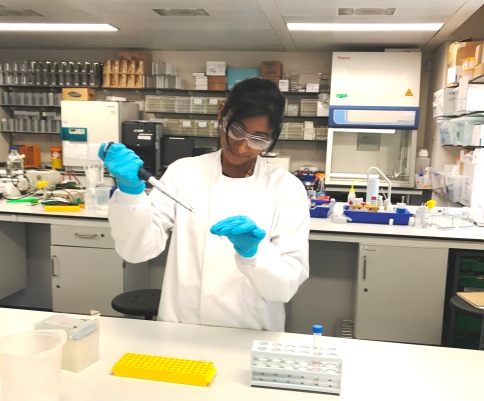How can you encourage undergraduate students to specialise and continue in endocrinology? The Society’s Undergraduate Achievement Award enables departments to reward and recognise the outstanding, endocrine-related work of undergraduate students. Successful departments receive £300 per year for three years, to award to students in any way they decide is most effective.
Director of Learning and Teaching at Kingston University Nigel Page tells us about the value of the award to his department, and his former student Nirun Hewawasam talks about how the experience set her off on a career in endocrinology.
“Recognising the talents of our students is vital, and the Society for Endocrinology Undergraduate Achievement Award gives us the perfect opportunity to do just that! This prestigious award has been a great way of encouraging academic excellence and bringing the field of endocrinology to the forefront of our students’ study. We have been able to offer the award to outstanding performances in our final year projects that have a specific endocrine theme. All of our winners from the last three years have felt the award has impacted on their decisions and confidence in being able to go on and successfully develop their careers in endocrinology, and have decided to undertake endocrinology related postgraduate research studies.
At Kingston University, this award has allowed us to recognise our most talented students and has helped in getting them to where they are today. In addition, it has been a fantastic way to advertise the work of the Society to our students and many of our undergraduates have taken the initiative to become members.
Each year we have been able to announce the award at our graduation ceremony to parents and guests, which is a real honour! The impact of receiving the award has been very positive to all parties, and is certainly something our students will always take away with them.” Dr Nigel Page, Kingston University.
Nirun Hewawasam joined Kingston University as an undergraduate pharmacology student. As she had a particular interest in type 2 diabetes, her final year project focused on investigating the role of the novel protein SMOC-2 in beta cell growth factor signalling. She received her Undergraduate Achievement Award in July 2014.

“I have always been interested in the field of diabetes, and although my project required a lot of effort and commitment, winning a Society for Endocrinology Undergraduate Achievement Award was highly rewarding and encouraged me to continue in the field of endocrinology. Currently, I am doing a PhD entitled “Intercellular communication and pancreatic islet function in type 2 diabetes” at the University of Roehampton, where I am investigating how two pancreatic islet hormones can modulate islet function and survival in type 2 diabetes. Being a research student has given me a lot of confidence, and being part of life changing research is exciting and fulfilling. So far it has been a great journey full of exciting experiences, including successful moments and hardships, but with rewarding outcomes.
I believe that the Undergraduate Achievement Award contributed to my being awarded my PhD studentship, thereby increasing my career prospects. The award constitutes a great opportunity to encourage any student to undertake a career in the field of endocrinology.” Nirun Hewawasam, Kingston University 2014 Awardee.

Applications for the Undergraduate Achievement Award are open from 14 June 2017 until 15 September 2017. Find out more about how to encourage excellence in your students!

This is an encouraging initiative. Could the Society go further and help to promote instigation of patient participation programmes in universities? UCL has an annual one for genetic disorders. This is a good way of giving undergrads early exposure to patients, and specifically those with endocrine conditions. I am told that these opportunities stick in the mind. Patient groups can help with this, but also help encourage a new generation of endocrinologists through their other public activities – we’ll be needing them ourselves after all! Combining forces could be very powerful.
LikeLike